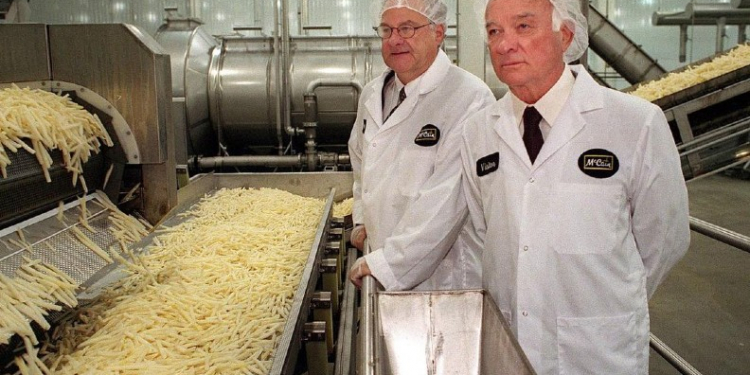By using frozen food technology, the brothers opened the first McCain Foods production facility in their hometown of Florenceville, New Brunswick, in 1957, producing frozen french fries, which have become a signature product, not only of the McCains’ company, but of the global potato industry.
This article appears in the November 2021 issue of Potato Grower.
Under the family’s leadership, McCain Foods quickly became established in the Canadian marketplace. That was just the start of a journey to become the world’s largest manufacturer of frozen french fries. Today, about one in every four fries in the world is a McCain Foods fry.
The McCain brothers (Wallace, Harrison, Robert and Andrew) were entrepreneurs of their time. As sons of a third-generation farmer, they used their family knowledge of agriculture and combined it with innovation.
As well as the McCain brand, McCain Foods Limited is made up of a range of companies operating within the prepared potato and appetizer segments, potato seed cultivation, transportation and more. These include:
- McCain Foods, which specializes in a variety of prepared potato products and appetizers, operating within both the foodservice and retail channels;
- Van Geloven, which supplies a wide range of frozen convenience snacks and foods across a variety of customer channels;
- Lutosa, a worldwide provider of fine potato products specializing in pre-fried french fries, frozen potato specialties and dehydrated potato flakes;
- CelaVita, a producer of chilled potato products that supplies fresh potato solutions to the retail, foodservice and industry;
- Infinity Foods, which produces frozen appetizers such as filled potato skins, green bean fries, and mac and cheese bites; and
- Day & Ross, an arm that provides integrated transportation and logistics services.
From the beginning, McCain has worked closely with the farmers supplying its potatoes and other products. Today, its network includes around 3,500 farmers across the world. McCain has been a leader in promoting agricultural sustainability, and actively collaborates with its to implement good agricultural practices related to food safety, traceability, environmental sustainability, biodiversity and soil health.
By embracing its entrepreneurial, innovative beginnings, McCain Foods has grown significantly over the years. McCain products—most notably fries and appetizers—are now available in more than 160 countries. The company employs a diverse team of 22,000 people across six continents, with global sales in excess of $8 billion. McCain Foods has expanded far beyond what Wallace, Harrison, Robert and Andrew McCain probably could have imagined 60 years ago. Yet the company remains family-owned, with the values of product quality, people, and customer service guiding everything it does.

“The pandemic has put a spotlight squarely on the precarious nature of our global food system,” said Max Koeune, McCain’s CEO. “But the largest challenges we face are related to climate change. It’s estimated that a quarter of man-made carbon emissions come from the production of food, and if we have to grow more food to feed more people, that will only intensify. If we don’t transform the way we grow food, the whole system is at risk of suffering irreparable damage.”
McCain plans to implement regenerative agricultural practices initially on its three ‘Farms of the Future’, the first of which is now operational in Florenceville, in the Canadian state of New Brunswick. Such farms are test beds for agricultural practices, supported by technology and innovation, which McCain could be implemented at scale and would be economically viable for farmers.
“Our belief in Regenerative agriculture goes back to our roots as a farm business,” said Koeune. “As a global leader in food production, McCain has a responsibility to re-imagine the way we grow a potato in a way that is beneficial for both the planet, and the communities where we operate. We have to act today to make things better tomorrow.”







